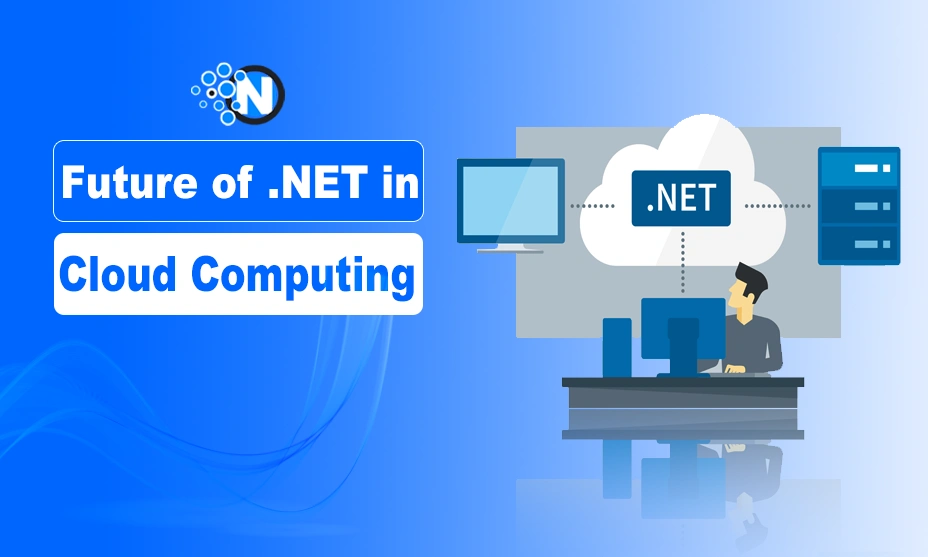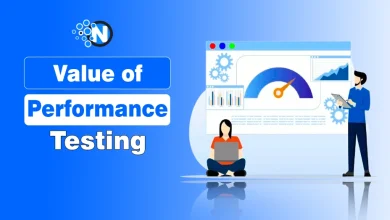Exploring the Future of .NET in Cloud Computing

While the face of the digital landscape keeps changing, it has been a combination of. With cloud computing, NET lays the ground for robust yet scalable applications. Such technological synergy amplifies efficiencies to reshape the Future for industry application development.
Similarly, .NET is popular for its amazing features in creating desktop, mobile, and web-based applications to increasingly leverage its extensive potential using cloud environments.
In this blog post, I will shed light on the future of .NET in cloud computing and how developers are integrating it in cloud environments.
Let’s start!
The Significance of .NET in Cloud Integration
The seamless integration of .NET with cloud platforms– primarily Microsoft Azure- makes NET a multi-purpose, high-performance tool for developers. All this makes it a go-to choice for enterprise businesses that want to expand their digital presence in the cloud using everything from web and mobile backends to IoT applications.

Addressing Developer Challenges
Developers are constantly seeking solutions that can simplify the complexities of cloud integration. .NET provides a more universal and unified programming model, along with standardized API, which will help a developer deploy highly available and scalable applications that are being demanded in today’s fast paced software environment.
The article highlights the advancement and strategic approaches that underline the role of .NET in cloud computing. We will examine how cloud development enhances operational capabilities to offer scalable solutions that cater to modern-day business needs.
The following sections will describe how .NET integrates with cloud platforms, highlight innovative trends in .NET cloud development, and discuss the best practices developers should adopt to stay ahead in the cloud-first world.
Integration of .NET with Cloud Platforms
The integration of .NET with cloud platforms is significant in the toolkit of .NET developers. Such a merger will develop a more dynamic, extendable, and robust set of applications that will use all the advantages of cloud computing.
Leveraging Microsoft Azure with .NET
Azure’s Seamless Compatibility with .NET: Microsoft Azure is a popular cloud platform among .NET developers due to its seamless integration capabilities with the .NET framework. From web apps and mobile backends to complex enterprise systems, it provides comprehensive services for .NET applications.
- Azure App Services: Azure App Services make it easy for .NET developers to deploy web applications that scale automatically to meet demand without the need to manage infrastructure.
- Example: A .NET developer can deploy an ASP.NET application to Azure directly from Visual Studio, utilizing Azure SQL Database to manage data effectively and integrate Azure Cognitive Services to add AI capabilities without extensive expertise in machine learning.
Cross-Platform Support with .NET Core
Expanding .NET’s Reach: .NET Core, a cross-platform version of .NET, extends the framework’s Reach beyond Windows, allowing .NET developers to build applications that run on Linux and macOS. This capability is crucial for businesses aiming for a broad deployment across diverse server environments.
- Containers and Microservices: .NET Core is optimized for building applications using containers and microservices architectures, which are essential for modern cloud applications. Kubernetes and Docker, popular choices for container orchestration, are fully supported, enabling .NET applications to be deployed and managed efficiently across any cloud provider.
Best Practices for Cloud Integration
Strategic Implementation for Cloud Success: For .NET developers, adopting best practices in cloud integration involves more than just technical know-how. It requires a strategic application design and deployment approach that aligns with cloud principles.
- Scalability and Performance: Utilize Azure Autoscale to ensure that your .NET applications can handle variations in workload seamlessly.
- Security and Compliance: Implement Azure Security Center recommendations to enhance the security of your .NET applications and ensure they comply with applicable laws and regulations.
Innovations and Trends in .NET for Cloud Development
.NET is still evolving in cloud development. Recent innovations and emerging trends shape how .NET developers approach cloud-native applications, making .NET increasingly relevant and influential in the cloud computing industry.
Serverless Computing with .NET
Leveraging Azure Functions: Serverless computing has revolutionized how applications are developed and deployed, allowing developers to focus on code instead of infrastructure management. .NET integrates seamlessly with Azure Functions, a serverless computing service that executes code in response to events.
- Benefits for .NET Developers:
- Cost Efficiency: Only pay for your computing time, reducing the cost of running applications with sporadic or unpredictable traffic.
- Scalability: Automatically scales up or down based on the demand, ensuring performance without manual intervention.
- Example: A .NET application using Azure Functions can automatically process images or files as soon as they are uploaded to Azure Blob Storage, showing the power and flexibility of serverless architectures.
Containerization: .NET Applications in Docker and Kubernetes
Containerization with Docker: Docker is synonymous with modern application deployment strategies, and .NET supports Docker natively. Containers package applications with all their dependencies, simplifying deployments across different environments and improving the development lifecycle.
- Kubernetes for Orchestration: Kubernetes, an open-source system for automating the deployment, scaling, and management of containerized applications, works excellently with .NET and Docker. This combination is ideal for deploying complex applications that require high availability.
- Example: A .NET Core web API containerized in Docker and managed via Kubernetes can effortlessly scale to handle increased load during peak times.
Embracing Microservices Architecture
Building Microservices with .NET Core: Microservices architecture breaks down applications into more minor, interconnected services instead of a single monolithic structure. This approach enhances agility, scalability, and innovation.
- Advantages for .NET Developers:
- Independence: Services can be developed, deployed, and scaled independently.
- Diverse Frameworks and Languages: Supports using different programming languages and frameworks that best fit the service requirements.
- Example: An e-commerce application can be split into services such as order management, product catalog, and user profiles, each running independently but communicating seamlessly.
Navigating the Future with .NET in Cloud Computing
Looking to the future of.NET in cloud computing, it is possible to assess how this strong framework keeps up with technological advancements and gives developers the opportunity to construct safe, scalable, and dynamic applications. By embracing trends like serverless computing, containerization, and microservices and integrating.NET with cloud platforms like Microsoft Azure, it is demonstrated how versatile and significant the framework has been in the development of cloud technologies.
Emphasizing Key Innovations:
- Serverless Computing: Because NET works with Azure Functions, developers can design scalable, cost-effective apps without having to worry about the underlying infrastructure.
- Containerization: .NET applications benefit from improved portability and management across a variety of computing environments thanks to the smooth integration with Docker and Kubernetes.
- Microservices Architecture: Businesses can increase agility and efficiency by using a microservices strategy with.NET to deploy and manage components of their systems independently.
Summing Up with Strategic Advice for .NET Developers
.NET developers who want to succeed in cloud computing should keep learning about these technologies and improving their expertise. Developers can build resilient, future-proof apps and careers that are in line with new tech trends thanks to the all-encompassing power of .NET and the abundance of services that accompany cloud platforms.




